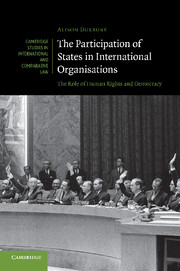Book contents
- Frontmatter
- Contents
- Foreword
- Acknowledgements
- Table of cases
- Table of treaties
- List of abbreviations
- Introduction
- 1 The move to institutions in the age of rights
- 2 The challenge of universality – the League of Nations and the United Nations
- 3 Rights, regionalism and participation in Europe
- 4 Restricting the ranks – excluding states from closed organisations
- 5 The relationship between powers, purposes and participation in specialised organisations
- 6 Legitimacy, democracy and membership
- Conclusion
- Select bibliography
- Index
- CAMBRIDGE STUDIES IN INTERNATIONAL AND COMPARATIVE LAW
- References
6 - Legitimacy, democracy and membership
Published online by Cambridge University Press: 01 March 2011
- Frontmatter
- Contents
- Foreword
- Acknowledgements
- Table of cases
- Table of treaties
- List of abbreviations
- Introduction
- 1 The move to institutions in the age of rights
- 2 The challenge of universality – the League of Nations and the United Nations
- 3 Rights, regionalism and participation in Europe
- 4 Restricting the ranks – excluding states from closed organisations
- 5 The relationship between powers, purposes and participation in specialised organisations
- 6 Legitimacy, democracy and membership
- Conclusion
- Select bibliography
- Index
- CAMBRIDGE STUDIES IN INTERNATIONAL AND COMPARATIVE LAW
- References
Summary
Introduction
The practice examined in the four previous chapters demonstrates that human rights and democracy have played an important role in determining both admission to and exclusion from a wide variety of international organisations. This movement is not limited to international or regional organisations of the West, but includes organisations of a global and universal character, as well as those established outside Europe. Human rights and democracy criteria have not been consistently applied within an organisation or across organisations with similar mandates or membership policies, but nevertheless have influenced decisions on participation. The role of these criteria has ranged from a form of collective legitimation of a state to a means of integrating countries within a region; a criterion for determining the application of membership sanctions and a method of promoting an organisation's ability to fulfil its functions. Individual member states and groups of states have also used the language of human rights and democracy in membership decisions to fulfil their own political objectives or to advance their ideological views. Admission and exclusion decisions have been conditioned on these criteria, although such a policy may clash with other objectives or purposes of the organisation, such as universality, regional integration and non-intervention in the domestic affairs of member states. Furthermore, the lack of a power within a constituent instrument expressly permitting an international organisation to expel or suspend a state has failed to prevent organisations excluding a member on the basis of human rights violations or breaches of democracy.
- Type
- Chapter
- Information
- The Participation of States in International OrganisationsThe Role of Human Rights and Democracy, pp. 265 - 310Publisher: Cambridge University PressPrint publication year: 2011



